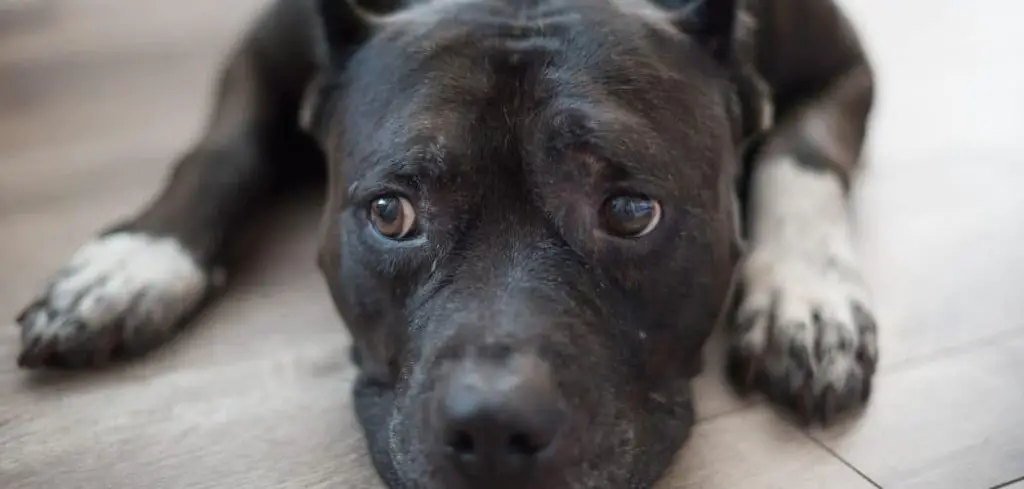It’s frightening to see an old dog pooping blood and refusing to eat. These symptoms can indicate a serious medical emergency and should never be ignored.
We outline the common causes of old dog pooping blood and not eating, what you can do at home, and when to seek veterinary help.
Old Dog Pooping Blood and Not Eating — Why It Happens
Blood in the stool and appetite loss in senior dogs can signal anything from intestinal inflammation to cancer or life-threatening infections. The digestive tract is sensitive, and in older dogs, even minor disruptions can lead to severe consequences. When eating stops and blood appears in the stool, it’s a clear sign the body is in distress.

Common Causes of Old Dog Pooping Blood and Not Eating
Hemorrhagic Gastroenteritis (HGE)
This condition causes sudden onset of bloody diarrhea, often bright red, and is frequently accompanied by vomiting and refusal to eat.
It may develop rapidly and lead to dehydration or shock. Though the cause is often unknown, it’s serious in any dog—and especially dangerous in seniors.
Immediate treatment with fluids and medications is critical.
Gastrointestinal Ulcers
Ulcers in the stomach or intestines can cause blood in the stool (often dark or tarry) and a loss of appetite due to nausea or pain.
Your dog may also vomit or seem weak and restless. These ulcers may result from medications, liver disease, or chronic stress.
Left untreated, they can rupture and become fatal.
Inflammatory Bowel Disease (IBD)
IBD causes chronic inflammation in the digestive tract, leading to intermittent bloody stools and reduced appetite.
You might notice weight loss, vomiting, or mucus in the stool. Senior dogs may not tolerate flare-ups as well as younger ones.
Long-term management is possible with diet and medications.
Read more: Old Dog Has Red eyes and Not Eating (This could explain why)
Cancer
Tumors in the digestive tract, such as colorectal cancer or lymphoma, can lead to bleeding and appetite loss.
You may notice straining during bowel movements, weight loss, or lethargy. Sometimes blood is the first outward sign.
Early intervention offers the best chance at preserving quality of life.
Parvovirus (in rare older dogs)
Though more common in puppies, unvaccinated or immunocompromised older dogs can still contract parvo.
This virus causes severe bloody diarrhea, vomiting, and total appetite refusal. It progresses rapidly and requires hospitalization.
Vaccination and early treatment are key to survival.
Rectal Injury or Anal Gland Issues
If the blood is bright red and only seen on the surface of the stool, the problem may be closer to the exit—like an anal gland abscess or rectal tear.
These can be painful and make eating uncomfortable. You may also notice scooting or licking the area.
Prompt veterinary care is needed to prevent infection.
What to Do If Your Dog Is Old, Pooping Blood and Not Eating
Withhold food temporarily (6–12 hours) but ensure access to fresh water. This gives the digestive system time to rest.
Do not attempt home remedies or human medications. Bloody stools require professional diagnosis.
Keep your dog calm and limit activity. Monitor the amount, color, and frequency of the bloody stool.
If your dog is still alert and drinking water, try offering a bland diet after the fasting period, but only if there’s no vomiting.
Take notes on additional symptoms—vomiting, lethargy, straining, or pain can help your vet diagnose the issue quickly.
When to Call or Visit Your Vet
You should seek immediate veterinary help if your old dog:
Has bright red or tarry black stool
Refuses food for more than 24 hours
Is lethargic, shivering, or showing signs of pain
Has repeated vomiting
Becomes weak or collapses
Any blood in the stool paired with appetite loss in a senior dog should be treated as urgent. The risk of shock, infection, or dehydration is high.
Your vet may perform bloodwork, fecal tests, imaging, or endoscopy to determine the cause and begin treatment.
Read more: Old Dog Being Sick and Not Eating (Don’t ignore these signs)
Key Takeaway
If your old dog is pooping blood and not eating, act quickly. These symptoms can point to serious gastrointestinal or systemic conditions.
Don’t wait to see if it improves on its own—seek veterinary help to identify the cause and get your dog the care they need.
Senior dogs deserve a comfortable, pain-free life. Fast intervention can make all the difference.
